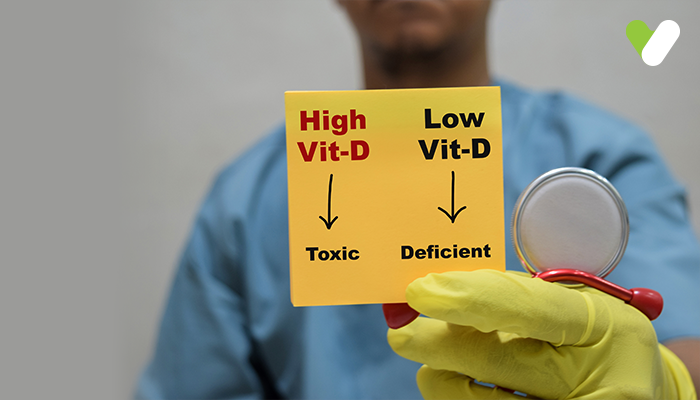Rohan has always had a deficiency of Vitamin d; after years of hearing everyone get more Vitam D, he finally took supplements. Vitamin D is essential for preserving your overall health. It's required for muscle cell growth and development and the normal functioning of the innate and adaptive immune systems, skeletal system health, and more. This is why the side effects of low vitamin d can raise your risk of illness and infection, bone demineralization, and a variety of other adverse health consequences. A lot of vitamin d side effects are a very prevalent occurrence. After a while, Rohan started feeling weak, and he went to the hospital; the doctor addressed his body as having too much Vitamin D.
Several factors, including: can cause vitamin D insufficiency.
- skin colour in the area
- where you reside
Hypervitaminosis D and vitamin D poisoning are two more terms for vitamin D toxicity.
The symptoms and vitamin d side effects are discussed in this article.1. Blood sugar levels that are too high
Vitamin D must surpass 100 nanograms (ng) per mL to reach hazardous or harmful levels in the body. Blood vitamin D levels exceeding 100 ng/mL are considered hypervitaminosis D, whereas serum values over 150 ng/mL are considered vitamin d side effects. Although recommendations for healthy vitamin D levels vary, research shows that 30–60 ng/mL levels are likely desirable and may aid in the prevention of sickness and disease.
While using high-dose vitamin D supplements, a healthy person's blood vitamin D levels are unlikely to rise. Incorrect supplement doses and prescription mistakes are the most common causes of vitamin D poisoning as a vitamin d supplement side effects.
In another case report from 2020, a 56-year-old lady was hospitalized for nausea, vomiting, and muscular weakness after taking an average of 130,000 IU of vitamin D per day for 20 months in the hopes of relieving her multiple sclerosis symptoms. Her vitamin D levels were found to be 265 nanograms per millilitre. It's worth noting that 130,000 IU is more than 30 times the daily safe limit of 4,000 IU, and she had vitamin d side effects.
Even though toxicity is rare if daily vitamin D consumption is kept below 10,000 IU and very high vitamin D supplement intake is avoided, doctors recommend that adults with average vitamin D levels do not exceed 4,000 IU of vitamin D per day as it can lead to side effects of low vitamin d.
2. Increased calcium levels in the blood
Vitamin D aids in the absorption of calcium from the diet. This is, in fact, one of its most significant functions. Hypercalcemia, or abnormally high calcium levels in the blood, is the most common indication of side effects of excess vitamin d.
Hypercalcemia can cause the following symptoms:
- Tiredness, dizziness, hallucinations, and confusion are all symptoms of digestive trouble, including vomiting, nausea, constipation, and stomach pain.
- a decrease in appetite
- Excessive urination
- Renal stones, kidney damage, and even kidney failure are all possibilities.
Nausea, vomiting, muscular weakness, and renal damage were symptoms of side effects of excess vitamin d. Hypercalcemia can be life-threatening and requires immediate medical attention.
3. Symptoms of the gastrointestinal tract
Excess calcium in the blood is one of the most common side effects of extra vitamin d.
Hypercalcemia can cause a variety of symptoms, including:
- nausea
- Vomiting
- constipation
- diarrhoea and a lack of appetite
- However, not everyone with hypercalcemia has the same set of symptoms.
After taking a supplement that was later discovered to have 78 times more vitamin D than specified on the label, one lady reported nausea and weight loss, all vitamin d supplement side effects. These symptoms were triggered by exceptionally high dosages of vitamin D3, which resulted in calcium levels of more than 12 mg/dL as side effects of excess vitamin d.
4. Changes in mental state
In those with vitamin D poisoning, hypercalcemia can cause mental changes. Confusion, despair, and psychosis are frequent vitamin D toxicity–induced hypercalcemia symptoms. Coma has been observed in severe circumstances. A 64-year-old man mistakenly consumed 200,000 IU of vitamin D per day because he misread pharmaceutical instructions, according to a case report from 2021. He displayed a changed mental state as well as other significant hypercalcemia signs. Lack of side effects of low vitamin d is also a concern.
5. Complications with the kidneys
Vitamin D intoxication can cause renal damage and even failure in certain people. This is because too much vitamin D in the body can lead to high calcium levels, inducing water loss through excessive urine and kidney calcification. Hypercalcemia can also cause renal blood arteries to contract, resulting in reduced kidney function.
Conclusion
Vitamin D is incredibly beneficial to your overall health. Even if you follow a healthy diet, you may require supplements to achieve optimal blood levels. However, there is such a thing as having too much of a good thing as vitamin d supplement side effects are also there.People with vitamin D shortage or insufficiency may be prescribed vitamin D supplements by their doctors as vitamin d supplement side effects are at risk. They will monitor your blood levels to assure your safety, and once you achieve appropriate levels, they will lower your dose or withdraw the supplement as side effects of low vitamin d. If you're using high-dose vitamin D pills, be sure a doctor is checking you.


